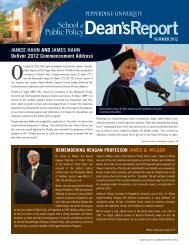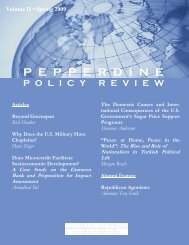Finding Permanent Homes for Adoptable Children - Pepperdine ...
Finding Permanent Homes for Adoptable Children - Pepperdine ...
Finding Permanent Homes for Adoptable Children - Pepperdine ...
You also want an ePaper? Increase the reach of your titles
YUMPU automatically turns print PDFs into web optimized ePapers that Google loves.
Administration to increase the federal orbit. It is true that this option eases state budgetary constraints,<br />
but conversely, it adds to the federal responsibility and federal budget. Moreover, with Operation Iraqi<br />
Freedom continuing into its most urgent stage, significant monies directed towards any new policy<br />
proposal are unlikely.<br />
Option one requires at the very least restructuring the ICPC, and at the most, uprooting the current<br />
system. Such a move, especially when directed on a large, countrywide scale, requires time and planning<br />
<strong>for</strong> the long term and <strong>for</strong> the interim period when the system is in flux. This lag time certainly will not<br />
precipitate more timely placements, one of the criteria laid out <strong>for</strong> a successful policy, and it is not in the<br />
best interest of the child in need of placement. If the overall goal remains to place more children into<br />
more adoptive homes, perpetuating a process that keeps children in the system, even if it is done under the<br />
guise of change, is not consistent.<br />
The actual administrative process <strong>for</strong> the ICPC, which is what will face the most dramatic change under<br />
option one, is the step within the process that functions relatively well. The real problem is not the<br />
administrative aspect of the ICPC, but rather the preparation and follow-up work done by both the<br />
sending and receiving state. This is to say that the initial communication in each state is effective, and it<br />
is the filtering of in<strong>for</strong>mation and the responsiveness of agencies and individuals that slows the process.<br />
These symptoms are difficult to remedy with the federalization of the interstate placement process.<br />
Regardless of an added supervisor, the dynamics on the local level, including activ ities of the social<br />
workers and agencies, require modification. In the end, federalizing this process retards the most<br />
effective aspect of the process by creating an additional layer of administrative oversight. In so doing, it<br />
actually impedes the ef<strong>for</strong>ts to create improvements and pursue avenues in the best interests of the<br />
children.<br />
Finally, federalization is not necessarily an option that educates more people about interstate placements.<br />
Nothing within the federalization process makes it safe to presume that if states submit this control to the<br />
federal government, the federal government will take the responsibility of placing more children into<br />
homes more seriously. Recruitment ef<strong>for</strong>ts <strong>for</strong> parents will still rest with the states, but ultimate approva l<br />
is required of the centralized authority. Outreach programs intent on educating more people about the<br />
ICPC option also remain removed from local control and are less effective if handled by the federal<br />
government; what works <strong>for</strong> one state may not work <strong>for</strong> another, and with planning occurring from one<br />
“desk,” the differences are rarely accounted <strong>for</strong>.<br />
23












